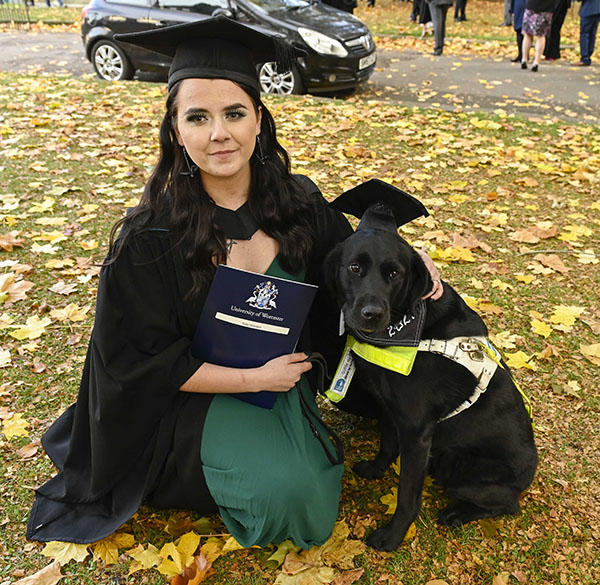Maisy McAdam
A student who lost her sight suddenly as a teenager overcame the challenges she faced to celebrate her graduation in November 2021.

“Honestly it feels incredible to be graduating,” said Maisy, who took to the stage with her guide dog Willow accompanying her. “I am so proud of the things I was able to achieve. I have so many people to thank, and so much to be grateful for.”
Maisy, who can see colours and shadows but no details, became a social media and news sensation in 2019 when she took part in a trial project for the BBC using the latest technology to try and enhance someone’s sight using special goggles. Her moving reaction to what she could see was filmed and went viral.
Two years on and, having finished her degree, she is now working in a specialist college as a Learning Support Assistant. “I am truly loving it. I am learning so much, and it is truly wonderful to be able to see the things I learned during my degree working in a real-life setting,” she said. “Watching the achievements of the students and recognising the positive pedagogical approaches the university instilled within me working is so fulfilling.”
Maisy would like to return to the University at some stage to study a Master’s, exploring further the development and delivery of relationships, sex and health education for learners with SEND (Special educational needs and/or disabilities).
“Aside from the friendships, and the fun times I had outside of the academic side of university, I had so many great opportunities. Learning from professionals and experts in the field, who allow for intelligent and open discourse was so valuable. The lecturers are so open to learning themselves and are grateful for student input at all stages of the learning process. I was often made to feel like an equal in terms of knowledge, it was never assumed that I knew less just because I was a student.”
Maisy was asked to contribute to a book written by her lecturers on the SENDI course, which is now being used on the essential reading list for future students on the SENDI course. “This was a huge privilege and so exciting,” she added.
When considering her future study, Maisy, who attended the Royal National College for the Blind in Hereford, heard about the University from a friend who also studied there who was blind. “She spoke so highly of the support she received from the Disability and Dyslexia Service team and was so pleased with the Student Union engagement,” said Maisy. “Upon further investigation into the Department for Education and Inclusion, I recognised the fantastic facilities, and the expertise from the department staff, and from that studying at Worcester seemed to me to be the best option.
“As a disabled student, it was also important to me to choose a university that was easy to navigate, I didn’t want to be in an overwhelmingly large city, with a campus that would be challenging to orientate. Worcester is not only a relatively small city, but all the campuses are within easy reach of the halls of residence, and the support I was able to have in orientation was fantastic. I never felt as though I was left to manage things on my own, as I was provided with sighted guides, mobility, and orientation training until I felt comfortable enough to manage the routes on my own.”
During her time at university, Maisy had a University-employed note taker who went into lectures with her and, thanks to disability funding, technology that allowed her computer to speak what she typed. She also had some adaptations when in her student halls, including a pen outside providing a litter tray for Willow, and tactile markers for the microwave and cooker.
The Covid-19 lockdown came into force as Maisy was concluding her dissertation proposal. She said: “When everything moved to an online learning platform, I was fearful that my being blind would be a barrier to getting the most from the learning experience. I was pleasantly surprised to find that all considerations had already been made, my note takers still attended the sessions remotely, I still had access to my weekly Academic Support Tutor, and all the pastoral services I’d been engaging with. This meant I never felt as though I was falling behind.”
Study Education at Worcester